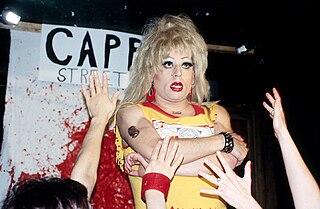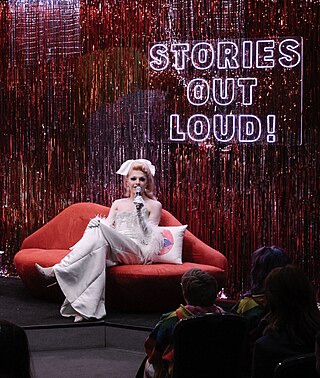
A drag queen is a person, usually male, who uses drag clothing and makeup to imitate and often exaggerate female gender signifiers and gender roles for entertainment purposes. Historically, drag queens have usually been gay men, and have been a part of gay culture.

RuPaul Andre Charles is an American drag queen, television personality, actor, singer, producer, and writer. He produces, hosts, and judges the reality competition series RuPaul's Drag Race and has received several accolades, including 14 Primetime Emmy Awards, three GLAAD Media Awards, a Critics' Choice Television Award, two Billboard Music Awards, and a Tony Award. He has been dubbed the "Queen of Drag" and is considered the most commercially successful drag queen in the United States, with Fortune saying that he is "easily the world's most famous drag queen."

Drag kings have historically been mostly female performance artists who dress in masculine drag and personify male gender stereotypes as part of an individual or group routine. As documented in the 2003 Journal of Homosexuality, in more recent years the world of drag kings has broadened to include performers of all gender expressions. A typical drag show may incorporate dancing, acting, stand-up comedy and singing, either live or lip-synching to pre-recorded tracks. Drag kings often perform as exaggeratedly macho male characters, portray characters such as construction workers and rappers or they will impersonate male celebrities like Elvis Presley, Michael Jackson and Tim McGraw. Drag kings may also perform as personas that do not clearly align with the gender binary. Drag personas that combine both stereotypically masculine and feminine traits are common in modern drag king shows.
Drag is a performance of exaggerated femininity, masculinity, or other forms of gender expression, usually for entertainment purposes. Drag usually involves cross-dressing. A drag queen is someone who performs femininely and a drag king is someone who performs masculinely. Performances often involve comedy, social satire, and at times political commentary. The term may be used as a noun as in the expression in drag or as an adjective as in drag show.

Trannyshack was a San Francisco drag club started by drag queen Heklina in 1996 as an offshoot of Klubstitute, and was a weekly fixture at The Stud bar in San Francisco for 12 years, drawing large crowds on a regular basis. The Tuesday night performances at The Stud ended on 12 August 2008, with Trannyshack resuming as a monthly event at DNA Lounge in March 2010.
The gender binary is the classification of gender into two distinct forms of masculine and feminine, whether by social system, cultural belief, or both simultaneously. Most cultures use a gender binary, having two genders.
RuPaul's Drag Race is an American reality competition television series, the first in the Drag Race franchise, produced by World of Wonder for Logo TV, WOW Presents Plus, VH1 and, beginning with the fifteenth season, MTV. The show documents RuPaul in the search for "America's next drag superstar". RuPaul plays the role of host, mentor, and head judge for this series, as contestants are given different challenges each week. Contestants are judged by a panel that includes RuPaul, Michelle Visage, an alternating third main judge of either Carson Kressley, Ross Mathews, or Ts Madison, and one or more guest judges, who critique their progress throughout the competition. The title of the show is a play on drag queen and drag racing, and the title sequence and song "Drag Race" both have a drag-racing theme.

April Carrión is the stage name of Jason Carrión, a Puerto Rican drag queen and television personality best known for their appearance on the sixth season of RuPaul's Drag Race.
Naysha Lopez is the stage name of drag performer and beauty pageant participant Fabian Rodriguez, who won the 2013 Miss Continental competition and appeared on the eighth seasons of RuPaul's Drag Race and RuPaul's Drag Race All Stars.

James Andrew Leyva, better known by the stage name Valentina, is an American drag performer, actor, television personality and singer who came to international attention as a contestant on the ninth season of RuPaul's Drag Race and the fourth season of RuPaul's Drag Race All Stars. In 2023, she was announced as the host of Drag Race México alongside Lolita Banana.

Eureka, also known as Eureka O'Hara and Eureka!, is the stage name of Eureka D. Huggard, an American drag queen and reality television personality. Eureka rose to prominence competing on the ninth and tenth seasons of RuPaul's Drag Race. She was removed from the ninth season due to a knee injury, becoming the first contestant in the history of the show to be sent home due to injury; she was then given an automatic berth to season 10, where she placed as runner-up. In 2021, Eureka competed on the sixth season of RuPaul's Drag Race All Stars, where she once more placed as a runner-up.
Charlene Incarnate is a Brooklyn-based female performer and writer. She started out her gender transition as a drag queen as part of her life experience.

Kade Gottlieb, better known as Gottmik, is an American drag performer and make-up artist. He became the first openly trans man to compete on RuPaul's Drag Race, coming in shared 3rd/4th place on the thirteenth season with fellow contestant Rosé. Gottmik co-hosts the podcast "No Gorge" alongside fellow drag queen, Violet Chachki.

Call Me Mother is a Canadian reality television series, which premiered on OutTV in 2021. Hosted by Entertainment Tonight Canada reporter Dallas Dixon, the series is a drag competition which will see up-and-coming drag performers join one of three drag houses to compete in group challenges, with one drag artist eliminated each week until the winner of the competition is crowned the "First Child of Drag".

Victoria Scone is the stage name of Emily Diapre, a British drag queen and cabaret performer based in Cardiff, Wales. She is best known for competing on the third series of RuPaul's Drag Race UK in 2021, where she was the first cisgender female contestant on any series of the Drag Race franchise. She returned to compete in Canada's Drag Race: Canada vs. the World in 2022.

Maddy Morphosis is the stage name of Daniel Truitt, a drag performer most known for competing on season 14 of RuPaul's Drag Race. He is the show's first openly heterosexual male contestant. Since 2023, he has hosted his own talk show webseries Give It to Me Straight.

Astrid Basson, professionally known as Dakota Schiffer, is an English drag performer and model who competed on the fourth series of RuPaul's Drag Race UK.

Jaidynn Diore Fierce is the stage name of Christopher Williams, an American drag performer who competed on season 7 of RuPaul's Drag Race. Originally from Tennessee, Williams continues to live and work in Nashville. He has spoken out against Tennessee's bill to ban public drag performance and gender-affirming care for trans youth.


















